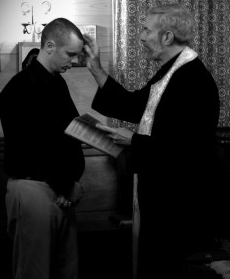by Jeremiah
 In order to join the Orthodox Church, I had to be chrismated. In this liturgical ceremony, the priest anointed me with chrism oil and prayed that I would receive the Holy Spirit. In charismatic circles, we would probably call this a “baptism of the Holy Spirit,” just without the speaking in tongues. While I certainly do not oppose speaking in tongues, and neither do several Orthodox leaders such as Fr Thomas Hopko, I believe that the fruit of the Spirit is even more critical than the ability to speak in an unknown language.
In order to join the Orthodox Church, I had to be chrismated. In this liturgical ceremony, the priest anointed me with chrism oil and prayed that I would receive the Holy Spirit. In charismatic circles, we would probably call this a “baptism of the Holy Spirit,” just without the speaking in tongues. While I certainly do not oppose speaking in tongues, and neither do several Orthodox leaders such as Fr Thomas Hopko, I believe that the fruit of the Spirit is even more critical than the ability to speak in an unknown language.
I am reminded of a song by Kirk Franklin in which he relates his young adult life. He attended an energetic, “Spirit filled” church, but his life was a wreck with ruined relationships, insecurities driving him over the edge, pornography addictions, etc. With a gripping honesty, he states, “The church taught me how to shout and speak in tongues, but preacher teach me how to live when the tongue is done.”
The “fruit of the Spirit” means the outcome of things. If I am truly Spirit filled and walking with the Spirit daily, then this fruit should be evident in my life and in my relationships with my spouse, coworkers, strangers on the street, comments in online communities, etc.
The fruit of the Spirit is love, joy, peace, patience, kindness, goodness, faithfulness, gentleness, and self-control (Gal 5:22-23).
Growing up charismatic
depressed_by_stengchen-d5es7ymWhile this is not meant to be an attack on the charismatic movement, it is meant to explain a bit of my story.  Like Kirk Franklin, I found that speaking in tongues could only get me so far. It seemed good when I wanted to pray but didn’t know what to say. But there was still so much wrestling with doubts, with sin, and with a fierce insecurity. I often hated myself and I felt dirty. I was certain that I was a disappointment to God.
Like Kirk Franklin, I found that speaking in tongues could only get me so far. It seemed good when I wanted to pray but didn’t know what to say. But there was still so much wrestling with doubts, with sin, and with a fierce insecurity. I often hated myself and I felt dirty. I was certain that I was a disappointment to God.
While a deeper understanding of the Father-love of God helped heal many of those wounds of insecurity and self-hatred, I still was left feeling an emptiness. There was something missing. I knew I needed Christ in way I had not experienced Him, but if the charismatic church couldn’t provide that then who could? I enjoyed the spontaneity of charismatic services for a while, but the hype and emotion could only carry me so far into the week. I needed something deeper.
I attended different churches (progressive, conservative, and in between) for a few years and had some very good times, and met quite a few good friends. But I still felt something missing; I longed for something I wasn’t finding in those places.
A puzzle piece wasn’t missing, I misunderstood the entire puzzle
When exploring Orthodoxy, I dove deeply into their teachings on prayer. My wife was the first to point out a transformation in me. She said I was so much more at peace then I used to be. In a positive way, she affirmed that I am not the same person that she married several years ago. And I began finding freedom in my private life, you know, that life that nobody else sees. No longer did I feel like a slave to sin. I still struggle daily to pick up the cross and crucify my fleshly desires, but not in the defeated manner as before.
While I don’t believe the Orthodox have any kind of monopoly on the Holy Spirit or prayer, their teachings and forms of prayer have made such a significant difference in my life. I did not join the Orthodox Church because I thought their theology was better, I joined because I was constantly encountering God in a very real and personal way and I simply couldn’t imagine being anywhere else.
No longer was my sin a focus. In Orthodoxy, I found that Christianity is not about sin management, speaking in tongues, moral improvement, or social progress. Instead, it is about healing and life, and ultimately communion and union with God. It is about receiving the Holy Spirit and finding God and His peace deep within my being. Moral improvement and social progress flow out of union with God, but to make those things the focus is to put the cart before the horse.
Healing and Wholeness
 In Orthodoxy I have encountered things that were foreign to me such as confession and the sacraments in general. Ultimately though, I found that these sacraments are here for my healing. I don’t go to confession so that someone holds me accountable; I go to find healing. My spiritual father doesn’t judge me; he prays for me. He has agreed to bear the burden of my sins and wounds with me. It has been freeing and beautiful.
In Orthodoxy I have encountered things that were foreign to me such as confession and the sacraments in general. Ultimately though, I found that these sacraments are here for my healing. I don’t go to confession so that someone holds me accountable; I go to find healing. My spiritual father doesn’t judge me; he prays for me. He has agreed to bear the burden of my sins and wounds with me. It has been freeing and beautiful.
In communion, we partake of the body and blood of Christ. This is not a nice symbolic act, but an integrating of God into every part of my being. The sacraments (including confession and communion) are for the healing of both body and soul. They are to bring me to a place in which I encounter God and find wholeness by being united to His Spirit.
Without Pentecost there is nothing
The outpouring of the Holy Spirit on Pentecost is critical to my faith. Without Pentecost, we have nothing to live for in this life. All we could do is look forward to the resurrection in the age to come. But Pentecost is here, the Holy Spirit dwells among us and inside of us. The Spirit heals us, makes us whole, and restores us to union with a God who is not “somewhere up there” but intimately dwelling within us.
I cannot think of much else to say other than to invite others to join me. This is not a belief system I can utilize to build crafty arguments and persuade you, but a journey and experience with God. While Orthodoxy has beliefs, it is ultimately a way of life that sets us into communion with our Creator.

Thank you so much for one of the most profound stories of conversion I have read. I, too am a convert. Converting means a deepening and a quickening of a relationship with the Father. God bless you.
Wonderful and real witness!
Jeremiah, When I was in seminary, I spoke with one of my fellow students who claimed he prayed in ‘tongues’. The question that immediately came to my mind was, “How do you know what you’re saying to God? How do you know you’re not blaspheming Him?” He had no answer. Do you?
The “fruit of the spirit is really the outcome of things” not speaking in tongues. I have no doubt. Still the fact that a few Orthodox priests neither propose nor condemn speaking in tongues gives me hope. Yes, it can be contrived and over done but it can also be a true spiritual experience. I watch SonLife Broadcasting, a pentecostal network, and have watched the minister tell congregants to open their mouth and speak utterances. This to me is unspiritual and not edifying. IT MUST COME NATURALLY AND IT HAS FOR SOME CHRIST-CENTERED PROTESTANT CHRISTIANS. I wish the same experience for Christ-Centered Orthodox Christians.
Pauline
Protestant
Pauline – it IS a true spiritual experience, but no one seems to ask if it is of the HOLY Spirit, or some other spirit. That lack of discernment is a terrifying lapse. “Tongues” as it is normally practiced in heterodox churches, seems to have little to do with what we see on Pentecost in the book of Acts. Instead, it seems a counterfeit gift – something demonic and intended to confuse. Best to avoid it until spiritual discernment is more developed.
Thanks for the great and well-written testimony. 🙂
“Even fools are thought wise if they keep silent, and discerning if they hold their tongues.” — Proverbs 17:28
I agree Fr. John! Until the Pentecostals can prove that their gibberish is not the result of being spiritually tricked into blaspheming God in ancient Sumerian, I will refrain from trying to “speak in tongues”. I prefer to pray to God in words we both understand, to respect the communal relationship of two people. I do not speak in gibberish to the people I love, out of respect for their personhood, so why should I pray in gibberish to The Person I love, namely, Jesus Christ !?
John
Former Protestant
Fr. John, I went to a couple of churches with new neighbors years ago, and was told me speaking in tongues might occur. These neighbors were very nice people and I just thought it would be like going to any other church service. It wasn’t. I do remember I was scared to death as “speaking in tongues” started up after the preacher called for it, and immensely relieved when it stopped. I couldn’t understand a thing of what was said, and had serious doubts the appointed ‘interpreter’ understood much either. I didn’t even understand the interpreter, although the English spoken was clear and audible. The same thing happened when a friend told me of her gift of tongues and proceeded to demonstrate it over the phone. I understood nothing of her nonsense babbling. It was uncomfortable and an experience I never want to repeat.
On that Pentecost day, the important part seemed to be that Romans, Greeks and locals all heard the message in their own vernacular with total comprehension, no interpreter needed. Tongues of flame seemed to be an added sign indicating the truth of what occurred. Fast forward to the latter part of the 20th Century, and the speaking in tongues I observed seemed very far from that story. I saw speaking in tongues, brought forth on command. This action is seen in so many churches today and as has been broadcast from the Church of the TeeVee Machine. Even with the little bit I know, I could easily discern it was quite different from the experience of that crowded room nearly two millenia ago.
I remember palpable fear when witnessing these directed performances, as in absolutely not THE HOLY Spirit. I’m not easily scared, but something was going on that was far more sinister, non-benevolent, and quite possibly a dangerous thing that could seriously mislead.
Fr George Fuchs,
That’s a good question. I don’t have a solid answer, but here are a few thoughts:
On a related note, when one journeys into mystical prayer, all sorts of things can happen: visions, encounters with angels or demons, hearing things in the spirit, and even items in the room moving seemingly of their own accord. It can be dangerous territory without a spiritual guide. But that doesn’t mean one should try to stay away from all things spiritual simply because there are unknown factors.
Discernment is important. I honestly felt this was a “useful” gift (as in it brought about spiritual/mental peace) during my restless teenage years. I didn’t do it publicly; in fact, hardly anyone outside of my family knew I did it. I always felt it was a personal communion between myself and God. Now, I usually don’t feel any need to pray in an unknown tongue.
Lastly, more important than what we say is where our hearts are. We can pray the most beautiful Orthodox prayers with complete boredom or inattentiveness and they profit us nothing. God knows the heart. There are many times I’ve prayed one word, “help!” I’m honestly not afraid of God being offended because I am trying to commune with him and I accidentally say the wrong thing. The entire purpose of prayer is to enter into communion and oneness with Christ. That’s not a free license to speak gibberish or not use discernment, but it is to say that God’s grace has a beautiful way of meeting our efforts.
I have a little story about my first Easter in a Greek church. I don’t speak Greek and I was very sad that I would not be able to sing the resurrection hymn with them. When the time came and they started singing, I was singing with them, understanding the words and knowing their meaning. Much like singing in my native language. It would be hard to describe the happiness I experienced in that night. At some point I started thinking of a rational explanation of what was happening and got lost. When I focused on the service again I was able the join the Greeks singing again. Later I thought that probably this is “speaking in tongues”. I am sure that was a gift from our loving Lord. Also the very first time I set a foot in a Greek church I was able to understand when they were saying “Glory to the Father, and The Son, and The Holy Spirit, now and ever and to the ages of ages. amen”.
I was raised Pentecostal and the emphasis on speaking in tongues was a heavy weight on my shoulders. One could not be “saved” if they were not baptized by immersion and spoke in tongues. Even though we had service 3x a week I still felt unsure and a little fake. No one had that relationship with God that radiated everyday, that deep abiding peace that was present in their faces. Just reading your article was an eye opener! I will do more research into Orthodoxy but it sounds promising.
April, please be sure and let us know if we can help. You will probably discover what many, many of us have – Orthodox Christianity is not the best choice: It’s the ONLY choice.
Eve, that is a beautiful story. Thank you for sharing.
April, as Fr John said, let us know if we can assist you on your journey in any way. I’m a baby in the Orthodox Church, but after experiencing it for several months I felt like Peter when Jesus questioned if they would leave him too, “Where else would I go?”
Jeremiah,
you are welcome.